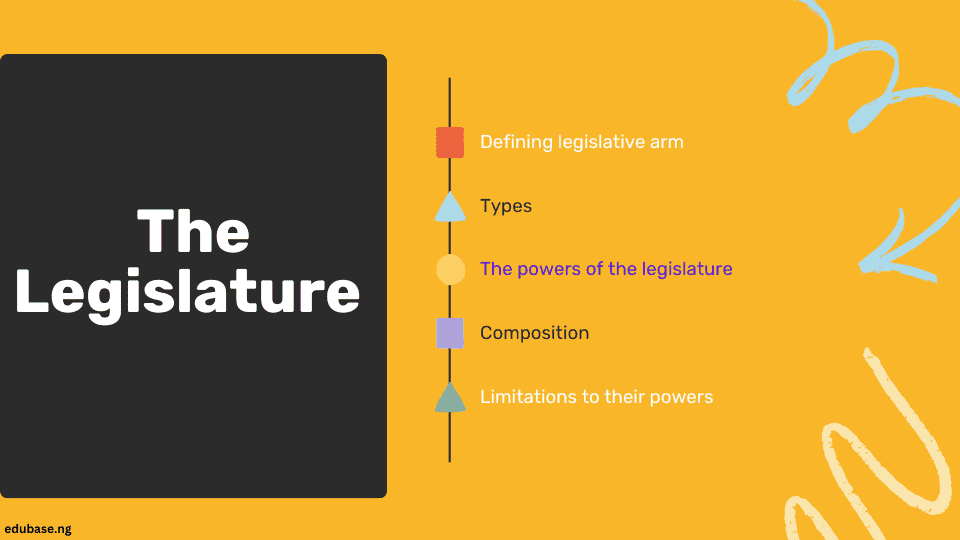The lawmaking and oversight functions are those of the legislature. The laws the legislative arm makes are passed to the executive arm for implementation.
Democracy is characterised by separations of functions and powers between the three branches of government- the legislature, the executive, and the judiciary. Each of them with specific roles, including serving as a check on each other so as to avoid abuse of power.
This class will focus on the legislative arm, which has its headquarters in Abuja, the Federal Capital Territory (FCT), where Nigeria’s elective representatives meet and carry out lawmaking functions.
Nigeria practises bicameralism at the federal level while unicameralism at the state level, the article is centred on the federal level,where the legislative arm is referred to as the National Assembly.
Types
Unicameral legislature (unicameralism)
Bicameral legislature (bicameralism)
Unicameral has only one legislative arm. Countries such as New Zealand, Sweden, Finland, Israel, Andorra, and Malta. Unicameralism is most popular among small countries with unitary systems.
Bicameral consists of two legislative chambers. Nigeria, for example, which operates bicameralism has the House of Representatives and The Senate. Both houses are known as the National Assembly.
The United States and the United Kingdom are examples. The U.S. calls its legislative arm Congress, consisting of House of Representatives and a Senate while in the U.K., the legislature is called the Parliament, which comprises the House of Commons and the House of Lords.
Composition
Nigeria’s National Assembly is made of the Senate and the House of Representatives from different political parties because the country practises a multi-party system. They are called lawmakers unlike in the United Kingdom where members of their legislature are known as Members of Parliament (MP).
The Senate is popularly called the Upper House while the House of Representatives is also known as the Lower Chamber.
The House of Rep is also called The Green Chamber while the Senate is commonly referred to as The Red Chamber.
The Legislature in Nigeria is made up of 469 elected members. The Senate comprises 109 members (three Senators representing each of the 36 states of the federation, one senator represents the FCT) while The House of Representatives is made of 360 members, each representing the constituency. Lagos and Kano states have the highest, each with 24 representatives at the Lower Chamber while the FCT has the lowest with just 2 Reps.
After winning elections and inauguration, the National Assembly (both houses) elect principal officers among themselves, this is an internal democracy within the floors of both Houses among the elected members, but there is so much internal politicking in the process.
The Senate is led by the Senate President while the House of Rep. is headed by The Speaker.
Through its work, the legislature is tasked to make sure that the interests of the people they represent come first. Although, there are criticisms over what the members of Nigeria’s National Assembly does in Abuja. Questions have been asked whether they actually represent the interest of their constituents.
Functions of the legislature in Nigeria
Here are the powers of the legislative branch of government:
Lawmaking role
The legislature passes the law in accordance with the constitution. They do this legislation by passing a Bill. After a Bill is passed, it becomes an Act. A Bill passes through different stages before they are passed. It is the role of the legislature to consider divergent views before a Bill is passed.
Financial Role
They do this by looking through the budget that is prepared by the Executive. This is how it works:
Every year, the executive through the Minister of Finance proposes a budget of the year, which is then presented to the legislature by the president. In this budget, expenditures of each of the agencies and federal ministries are outlined, which is reviewed by the legislature.
Most times, there are several Houses Committees that grill heads of ministries and agencies how their budget will be spent. The legislative has the power to reject a budget prepared by the executive where they detect conflicting figures or when clarity is needed.
In a country where tenets of democracy are paramount, the executive has no power to spend until the legislature vet the proposed budget of the executive.
Oversight functions
The role of the legislature doesn’t end at passing the budget for the executive, they take a step further to critically monitor the budgetary implementations of the executive arm. They do this by making sure that what has been budgeted for are where funds are channelled to.
This means that after approving a budget for the executive, the lawmakers activate their auditing role by ensuring monies are spent for the purpose of which it is explained in the budget.
Confirming executive appointments
When the president wins an election, his next action is to constitute his cabinet. He does this by appointing people whom he believes would help in delivering his campaign promises.
He sends his list of nominees to the Legislative arm. The legislature asks relevant questions if a portfolio is attached against each of the nominees. All ministers and major appointments by executive are screened and ratified by the lawmakers.
Investigating the executive arm
If petitions of gross abuse of power are submitted against any members of the executive, it is the responsibility of the National Assembly to constitute an investigative committee to look into the matter.
In May 2024, for instance, the Nigerian Senate vowed to set up an investigating panel to probe 11,856 projects that were abandoned by the executive arm. It is one the responsibilities of the legislature to beam its searchlight on the projects that the executive claimed to have executed.
Inquiry Role
When it becomes imperative and of national interest, the legislature can inquire about the activities of the executive. They do this by seeking details of spending or actions of the executive when it borders on national interest.
They do this by inviting any member of the executive to ask questions to seek clarification. They can issue a warrant against anyone who fails to honour their invitation.
Impeaching the president for gross misconduct
The condition for impeaching the president is provided for in section of the constitution. The executive can rely on the constitutional provision to serve an impeachment notice on the president if he is believed to have grossly violated the constitutions.
Constitutional amendment function
When there is a public outcry over a section of the constitution, the legislature can pass a law for an amendment to correct an anomaly in the section of the constitution. Amendment is carried out by calling for contributions from their constituents and major democratic stakeholders and civil societies.
Educate members of the public
Through legislative process and public debates, they use the floors of the house to educate members of the public.
Checks on the executive
The legislature set the executive on their toes through public scrutiny of their expenditures and implementation of government policies.
Removing erring executive members
The legislature can mount pressure on the president to remove any member of the executive that is suspected to have mismanaged public funds or whose acts are against the public.
Limitations
The power of the legislature in Nigeria is limited by the 1999 Constitution. The judiciary, which is the third branch of government, checks the exercise of power by the legislature.
Practice questions
- Comprehensively explain the composition of Nigeria’s legislative branch of government.
- Apart from making laws, what other powers does the legislature have that make them a very important branch of the government?
- Which specific roles does the legislature play to ensure that the governed get the dividends of democracy.
Join EdubaseNG WhatsApp Channel to get the latest education & student loan tips
Join our Telegram Channel to get the latest news about Student Loans & Education News.
Are you a stakeholder in education? You can become our guest writer. Write to us using our our email address here




